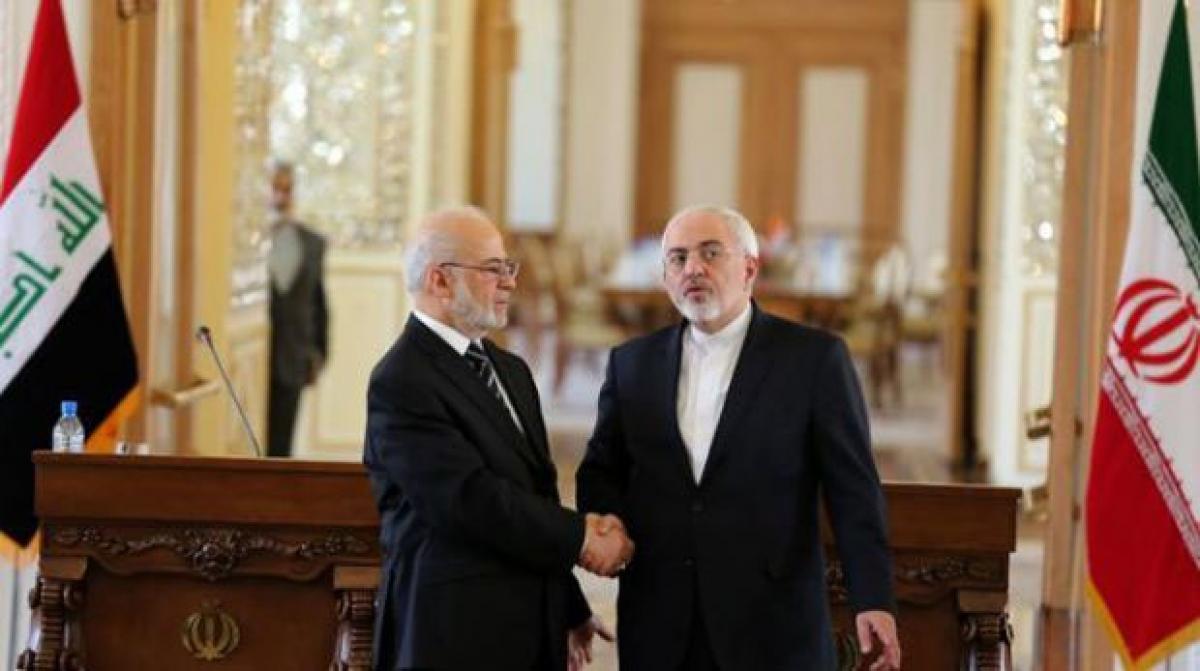Live
- India Capitals appoint Ian Bell as captain for LLC season 3
- MP CM to visit Kolkata to attend Global Business Summit on Friday
- 49th All India Music & Dance Competitions Begin Today with Inaugural Ceremony
- Popular auctioneer Richard Madley to helm SA20 player auction on October 1, 2024
- President Murmu wins hearts in MP, seeks blessing of Mahakaal
- Israel puts forward new Gaza ceasefire deal: state media
- Over 100 Chakma houses & shops set on fire in B’desh, claims rights body
- MAHE Researchers Ranked Among the Top 2% Globally for 2024 in Prestigious Citation Database
- Woxsen University Secures 6th Spot in Asia-Pacific in the prestigious Bloomberg Best B-School 2024 Rankings
- Yamaha launched ‘The Call of The Blue’ Version 4.0 brand campaign for the young and dynamic customers
Just In

x
Highlights
Iran warned Saudi Arabia on Wednesday to stop working against it as their diplomatic crisis intensified despite efforts to defuse a row that has raised fears of greater regional instability.
Iran warned Saudi Arabia on Wednesday to stop working against it as their diplomatic crisis intensified despite efforts to defuse a row that has raised fears of greater regional instability.
.jpg)
As diplomats arrived home after being told to leave Saudi Arabia, Shia-dominated Iran fired the latest verbal salvo in a dispute that has seen Riyadh and some Sunni Arab allies cut diplomatic ties with Tehran.
At a press conference in the capital, foreign minister Mohammad Javad Zarif said Riyadh must end prolonged efforts to confront Iran.
Citing longstanding differences that became a full-blown split after Saudi Arabia executed Shia cleric and activist Nimr al-Nimr, Zarif said the Sunni-ruled kingdom had sought systematically to inflict damage.
“For the past two-and-a-half years, Saudi Arabia has opposed Iran’s diplomacy,” he said at the press conference with Iraqi foreign minister Ibrahim al-Jaafari.
“Saudi Arabia has moved against our efforts and, unfortunately, they opposed the nuclear agreement,” Zarif said, also accusing Riyadh of “taking measures against the Iranian people” through its efforts to keep oil prices low.
“This trend of creating tension must stop. We need to stand united... and stop those who are adding fuel to the fire,” he added.
The spike in tensions comes after Iran last year secured a historic nuclear deal with world powers led by the United States, causing major concern in longtime US ally Riyadh.
That deal, when finally implemented, will end sanctions on Iran’s oil and gas industry that could see the Islamic republic challenge Saudi Arabia’s role as the Middle East’s dominant energy and economic power.
Saudi cuts oil price
Oil prices have fallen by more than 60 percent since mid-2014 as OPEC kingpin Saudi Arabia refuses to lower production in a bid to push competitors out of the market, hurting the income of other producers, including Iran.
On Tuesday, Riyadh cut the February price of its export oil to Europe in another move to win market share.
Nimr’s death sparked demonstrations in many countries including Iran, where protesters stormed and set fire to the Saudi embassy in Tehran as well as the kingdom’s consulate in second city Mashhad.
Riyadh cut ties with Tehran in response and was joined by some of its Sunni Arab allies including Bahrain and Sudan. The United Arab Emirates also downgraded relations with Iran and Kuwait recalled its ambassador.
Staff at Iran’s embassy in Riyadh and its consulate in Jeddah flew home on Wednesday, Saudi state news agency SPA reported.
Iran’s state broadcaster IRIB said a plane carrying 54 Iranian diplomats and their families had landed at Tehran’s Mehrabad Airport.
The dispute has raised fears of an increase in sectarian tensions in the Middle East that could derail efforts to resolve pressing issues including the wars in Syria and Yemen.
The United Nations and Western governments have expressed deep concern, urging both sides to reduce tensions.
US Secretary of State John Kerry has made repeated calls to both Iranian and Saudi leaders.
“He is urging calm. He is stressing the need for dialogue and engagement, and thirdly, reminding that, again, there’s lots of work to be done in the region,” State Department spokesperson John Kirby said on Tuesday.
Saudi Arabia and Iran are on opposing sides in some of the Middle East’s worst conflicts.
In Syria, Iran is supporting the government of President Bashar al-Assad against rebel groups, some backed by Saudi Arabia.
And in Yemen, Riyadh is leading a military intervention against Iran-backed Shia rebels who have seized control of large parts of the country.
Iran-linked ‘terror’ cell
Within hours of the embassy attack, Iran’s President Hassan Rouhani called the violence “totally unjustified” but accused Saudi Arabia on Tuesday of focusing attention on the incident to “cover its crime” of executing Nimr.
Zarif reiterated that the embassy’s ransacking had no official blessing. “All Iranian officials condemn it,” he said.
Jaafari, who was to also hold talks with Rouhani, said Iraq was seeking a potential diplomatic role to help resolve the crisis and echoed the concerns about sectarianism.

Next Story
More Stories
ADVERTISEMENT
© 2024 Hyderabad Media House Limited/The Hans India. All rights reserved. Powered by hocalwire.com







